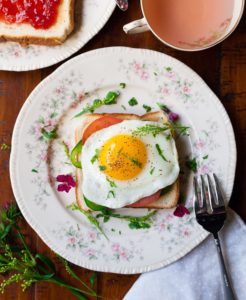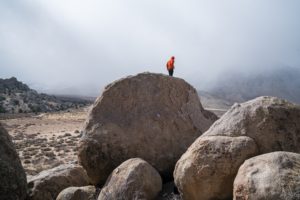by Jenny Rose | Feb 23, 2017 | A Flourishing Woman, Body, Food
I recently read a blog post about vegan bullying.
Yep. You read that right. Vegan bullying is a thing.

Photo by Joseph Gonzalez on Unsplash
It’s time for me to write about food.
I grew up in the 60s and 70s in a middle-class family with the standard education about the food pyramid, Food Commandments from the ADA, and a mother who was very concerned and conscientious about feeding her children and animals in the best possible way. Remember Adele Davis?
In my adult life, I was never a vegan or even a vegetarian, but I did eat mostly fruit, grain and vegetables. I bought organic whenever possible. I took supplements. I baked my own bread and desserts, made my own granola, and cooked gallons of stews, soups, chili and hot cereal over the years in my crock pot for my family.
Thanks to my mom’s good sense, my lack of a sweet tooth, and my income level, soda, fast food, candy, donuts and other mass produced sweets have never been a large part of my food intake.
All my life, I’ve sincerely believed I’ve had a healthy, well balanced diet. I avoided white sugar, high-fat and junk food. I made smoothies with low-fat unsweetened yogurt. I grew my own vegetables and herbs. I’ve never been overweight. In fact, I’ve had trouble keeping weight on.
I have a family and/or personal history of rheumatoid arthritis; inflammatory bowel disease; fibromyalgia; constipation; poor circulation; restless leg syndrome; migraines; gout; chronic pain; chronic fatigue; muscle spasm; insomnia; depression; anxiety; asthma; skin and sinus problems; food, environmental and drug allergies; and hypothyroidism.
It’s interesting to note how much of this list has to do with inflammation.
The list is kind of daunting written out like that, but members of my family rarely go to the doctor or take any kind of medication. None of us are overweight. Mom and I don’t drink alcohol or smoke. A lot of the above diagnoses are nebulous and chronic rather than acute. We take vitamins, exercise, try to eat well and control our stress, and do our best with the constant presence of chronic pain and discomfort. Conventional medicine can’t do much for most of this list except prescribe pain meds, anti-depressants, anti-inflammatories, antihistamines and anti-anxiolytics.

Photo by freestocks.org on Unsplash
Stepping back and considering our current social context in America, we have millions of people suffering from obesity, diabetes, heart disease and a dozen addictions, not the least of which is the current exploding opioid dependence. Millions and millions of people are suffering with increasing anxiety and other mental health challenges, exacerbated by the current political and social climate. Weight loss programs, supplements, books and weight gurus make billions of dollars a year. We’re obsessed with food and our relationship to it.
Food production is complicated and often unethical, to say the least. Monocropping practices by Big Agriculture annihilate the land, destroying the delicate, complex web of plants, soil organisms, animals and insects. We’re exposed to artificial fertilizers, insecticides and other poisons, whether we use them or not.
Commercial animal food production practices have frequently been horrifically inhuman and unhealthy, both for the animals and for consumers.
Healthcare, to put it kindly, is in disarray. As a medical transcriptionist, I routinely transcribe medication lists that contain twelve or more prescription drugs. Exponential pharmaceutical costs are in the headlines. I myself have insurance, for the moment, through Obamacare, but it’s useless. The only insurance I can afford has a $5,000 deductible. I couldn’t deal with a $500 deductible. I never see a doctor unless it’s a dire emergency, and then I always have to fill out indigent care paperwork to get a sliding scale fee.
Adding to the confusion is the ever-present influence of money. Advertising. Food stamps. Fast food. Dating. Meeting friends for a drink or at the coffee shop. We struggle to feed our families. We debate about vending machines in schools and school lunches. We deal with food-borne illnesses. We have no money and live on beer and ramen noodles, or oatmeal, or rice and beans. We know from advertising the right food can make us beautiful, make us strong, cure our ills, provide us with happy relationships, better hair, younger and more attractive bodies, a perfect date. We should eat beef. We should eat gluten free. We should eat organic. We should eat a pizza. We should eat vegetarian. We should drink milk. We know how to eat well, but we can’t afford to. We know how to eat well, but the rest of our family won’t cooperate. We know how to eat well, but we don’t have time.
Yet all life must eat. A living body is a complex system of energy, organs, elements and chemistry, and we know a lot about how the complex system of the human body works. If we don’t feed our body well, it gets sick.
We all think we know what it means to eat well, based on learned information, our experience within our own bodies, our observations of others, and in some cases our spiritual and political beliefs. Of course, it’s hard to think clearly when in the grip of an addiction to sugar and carbs (this includes alcohol), but that counts only if we acknowledge our addiction and its power to drive our behavior, right?
We all know what a good diet is. Everyone knows. It’s merely a question of self-discipline.
If only it was that simple.
In fact, everyone doesn’t necessarily know what a good diet is, for themselves or anyone else. There’s a lot of confusion, a lot of disagreement, a lot of conflicting “science” and advice. There are a lot of social, financial and political agendas, a lot of manipulation and brainwashing, a lot of misleading and frankly false “information.”
Why is one of the most basic activities of life so complicated? Why is there so much conflicting “information?” Why are we so unhealthy? Why are we so dependent on Big Pharma? Why are people in their late 20s having heart attacks and strokes? Why is there an obesity epidemic? Why is diabetes on the rise?
When did we get to the point of vegan bullying, or any kind of food bullying, for that matter?
Finally, lest we Americans forget there are people outside America, how is it possible that famine still exists in the world when so much food is wasted and discarded every day? What social and political dynamics allow people to starve to death in Africa or anywhere else, while other populations suffer malnourishment and metabolic starvation encased in obesity?
Lastly, why is the topic of diet so inflammatory? Why do vegans and vegetarians bully meat eaters? Why is eating meat conflated with gun rights, hatred and cruelty? Why is it unacceptable to challenge our current belief systems around food?
Hard questions without simple answers. Hard questions guaranteed to outrage lot of people.
Why?
This topic to be continued here, here. and here.
Please see my Resources page for more information on food, diet, nutrition and health.

Photo by Jonathan Simcoe on Unsplash
All content on this site ©2017
Jennifer Rose
except where otherwise noted
by Jenny Rose | Feb 16, 2017 | Contribution, Emotional Intelligence
I read a post on resistance lately from one of my favorite writers, Sharon Blackie, and was deeply comforted. She reminded me we all have something to offer the world. Ever since reading it, I’ve been thinking about what resistance means to me, and the different forms it takes in my life.
Then, last week, Elizabeth Warren was silenced on the Senate floor (but not elsewhere!), and Mitch McConnell made history with his justification. “She had appeared to violate the rule. She was warned. She was given an explanation. Nevertheless, she persisted.“
A violated rule. Heaven help us. Disobedience. Failure to comply.
Resistance and persistence. What an unholy pair.
This morning I sat down to write this post, as is my habit on Wednesday morning before I go swimming, but I couldn’t get anywhere with it. All I could think about was this quote, and how it makes me feel, and how absolutely persistent resistance is! After a few minutes the words stopped making any sense at all.

Photo by Todd Quackenbush on Unsplash
So, I went swimming. In the pool, I began the rhythm of stroke and breath, felt myself held by the water as though it loved me, and entered into the ebb and flow of my thoughts and feelings, not struggling for wisdom, focus or creativity, not trying to problem solve, just being.
“She had appeared to violate the rule. She was warned. She was given an explanation. Nevertheless, she persisted.“
I thought about how hard I’ve tried to earn love all my life with my silence, and how it hasn’t worked, and how now, in my fifties, I feel overwhelmed with grief because I wanted my family to be proud of me. I wanted to be allowed to love them and feel loved and supported in return. I wanted to get held and reassured. I never wanted to be the boat-rocker, the problem child, the difficult one, the dramatic one, the disappointment. I never wanted to drain any resource, need anything, be any kind of burden or cause any harm. I wanted to be a joyful thing, not an embarrassment and a failure.
“She was warned. She was given an explanation. Nevertheless, she persisted.“
I thought of the persistence of things. Life, women, children, longing, desire, dreams, cycles and seasons, death, black flies, weeds. The persistence of grief. The persistence of loss. The persistence of love, in spite of everything, even if never returned or expressed.
I cried in the pool, as I swam one lap after another. For all you non swimmers out there, having a good cry while wearing swim goggles makes the goggles fog up, in addition to filling with salt water. On the plus side, you can make as much noise as you like underwater, and no one will ever hear you. Also, having a wet face and red eyes at the swimming pool isn’t remarkable.
I needed to cry. I needed to swim. I paused every two laps and cleaned out my goggles.
It came to me then that this is my resistance.

Photo by Travis Bozeman on Unsplash
This. My tearful swim and fogged-up goggles. My blog. This messy, painful, not-pulled-together, nonheroic experience I call my life is my resistance, and I persist in it. I cannot beat, starve or mutilate myself into someone else, not even to get loved. Believe me, I’ve tried. In the end, though, the half-wild thing I am still looks out of my eyes and lurks in my heart. Perhaps not attractive or worthy of love, but there. Wanting. Alive. Persistent.
Some people think power is the ability to shut someone up, but power and force aren’t the same thing at all. The ability to throw acid on someone, to fire someone from his/her job, to rape, to behead, to kill someone’s family, to detain someone, to torture, to murder — that’s not strength. That’s not real power. Silencing others doesn’t mean we’ve won, or that anything has changed. All it means is, for the moment, we’re not forced to hear something we’re afraid of, but the words and resistance are still there. They’ll be spoken again, in music, in writing, in action, on YouTube. Someone else will pick them up and say them, and someone after that, and someone after that.
“Nevertheless, she persisted.”
At the end of the day, the only power we have in life is to do what we can with what we have, and the one thing we all have is ourselves. The self is a persistent thing.
So much is needed in the world. So much love, so much healing, so much courage and forgiveness. We need heroes and leaders, activists and rebels. We need organizers and people to march, hold placards, make phone calls and show up in front of the cameras with hard questions.
My gifts and abilities are not these.

Photo by Miranda Wipperfurth on Unsplash
But we also need people who nourish roots. We need people who whisper to trees. We need people who gather bones and seeds. We need storytellers and lovers, dancers and shamans, intuitives and creatives. We need people who can collaborate, share power and shape self-sustaining community that’s not based on capitalism. We need people who can include, connect, learn and grow. We need people who can hold another human being in their arms while they weep.
We need persistent people who know how to resist a diseased overculture and endure tribal shaming, abuse, tyranny, injustice, poverty and loss. We need people who think for themselves, who are persistently curious, who aren’t afraid to break someone else’s rules. We need passionate people who know how to feel deeply.
These are things I do.
These are things I am.
So, today, my resistance consists of tears and laps, this week’s post, and being persistently present in my quiet, unimportant, ordinary life. My resistance is my persistent longings and desires, my refusal to give up and be silent. I don’t resist because anybody cares or notices, or because I think I can make a damn bit of difference.
I do it because that’s what I do and this is how it looks.
“Nevertheless, she persisted.”
Yes, indeed.

Photo by Tim Gouw on Unsplash
All content on this site ©2017
Jennifer Rose
except where otherwise noted
by Jenny Rose | Feb 9, 2017 | A Flourishing Woman, Self-Love
I recently read a brilliant essay on tolerance that clarified for me why I haven’t always experienced successful outcomes while practicing it! Here’s a quote to think about from that article:
“[Tolerance] is an agreement to live in peace, not an agreement to be peaceful no matter the conduct of others. A peace treaty is not a suicide pact.” –Yonatan Zunger, ‘Tolerance is not a Moral Precept’

Photo by 小胖 车 on Unsplash
I’ve found that one of the many unpleasant effects of pleasing people, trying hard, being compliant and demonstrating unfailing compassion and kindness is that it’s stunted my emotional growth. It’s made me weak, naïve and dependent. It’s taught me to be powerless.
At this point in my life I’m making different choices, and as I do that I’m losing my fuzzy-headed, goody-two-shoes, sweet maiden aspect and becoming much clearer about who I am and what I believe in.
I’m not the only one, either. My second-hand exposure to social media through my partner, as well as my own reading of blogs, articles and essays, demonstrates loud and clear that many of us are in the process of refocusing our beliefs and values. Just yesterday I read an article about the devastating impact of the presidential election on close relationships and social media communities, as well as the way it’s opened up new connections.
As I listen, watch, read, write and think about it all, I return, again and again, to the conclusion that we’re all dealing with the same underlying ideas and issues. I know there’s a lot of heated and poisonous ideology out there about race and ethnicity, sexuality and gender politics, religion, and even what we eat, but underneath all that distracting noise are the same issues of tolerance and intolerance, power and identity, and fear.
I’ve written previously about reciprocity. When I read Zunger’s post, I immediately understood why my practice of tolerance has had, in some cases, quite devastating results. Once again, I was extending something I wasn’t receiving in return. Having been well trained (and slightly dim) it didn’t occur to me before that it’s not my responsibility to meet intolerance and disregard for my own boundaries with continuing tolerance. I’ve clung to the dangerous belief that if I just model and demonstrate well, the other party or parties will get it, and want to live in a more peaceful and effective way (my way, of course!)
After all, I don’t want to stoop to their level!
Ick.

Photo by John Salvino on Unsplash
This is a pretty effective set of shackles. Like many women, I’ve accepted them meekly for most of my life.
I’m bored with that now. It’s never worked well. It’s always left me terribly and painfully vulnerable. Turn the other cheek sounds like a lovely ideal, but in practice it sucks. In my study of combatives, I’ve found another option: Go in peace, but if a predator attacks you, be so explosively aggressive you become the predator and they become the prey. Take them out of commission as fast and effectively as possible and get away from them. Permanently.
I know, I know. Unattractive. Not nice. Being part of the problem rather than the solution. Violence solves nothing.

Photo by Jason Blackeye on Unsplash
That’s all fine, if it works for you.
It hasn’t worked for me. I’m not sure why it’s unattractive and wrong to defend myself (or others), except, of course, from the predator’s point of view.
I don’t care what the predator thinks. Predators have to take their lumps, just like the rest of us.
It seems these days going in peace means having no opinions, asking no questions, voicing no disagreement, stating no beliefs and citing no personal experience. There’s sure to be someone who will step in and try to shut us down with violence, abuse and threats if we speak up.
I love the idea of tolerance as a peace treaty. It gives me everything I need. It accommodates my intention to seek and support connection. It allows me to continue to be completely disinterested in someone’s religion, sexual preference, gender experience, physical anatomy, race, ethnicity, diet or reproductive choices as a criterion for judgement. Tolerance as a peace treaty leaves ample room for the things I do care about — authenticity, compassion, power-with rather than power-over, the desire to connect. It’s a peace treaty I can honor whole-heartedly.
Right up until someone tells me to shut up and sit down, make myself small, stop asking questions. Right up until someone tells me what to believe, what spiritual framework to use, what to think, what agenda to accept, what to do with my body and what my boundaries should be. Right up until I feel uncomfortable, in fact. Then the peace treaty is broken, and I give myself permission to exit, quietly if allowed and like a fighting tigress if hindered.
Tolerance is not an expression of weakness. It’s not permission to use and abuse. It’s not an agreement to abdicate self-defense. It’s not a suicide pact.
Nobody is entitled to tolerance.
Tolerance is a gift that must be both given and received. Let’s be worthy of it.

Photo by Evan Kirby on Unsplash
All content on this site ©2017
Jennifer Rose
except where otherwise noted
by Jenny Rose | Feb 2, 2017 | Contribution, Emotional Intelligence
This week’s post is suspended between two stories. The first one is the old Greek myth of Sisyphus.
Sisyphus was a crafty and deceitful king who craved complete power. In his pursuit of power, he offended many men and gods and was eventually punished by being sent to the underworld and forced to roll a huge boulder up a steep hill. The boulder was enchanted, however, to roll back down the hill (over Sisyphus, in some versions) just before it reached the top. Thus, Sisyphus was doomed to repeat the same unending and futile task forever.

Photo by Tommy Lisbin on Unsplash
Sisyphus has captured the imagination of many writers, philosophers and artists, and there are several variations and interpretations of his story. If you’re interested, you can follow the link to to Wiki and read more.
Sisyphus is on my mind this week, not only because his story suggests to me the inevitability of rising and falling cycles, but also because his punishment was to forever try and fail.
His punishment was to forever try.
Huh.

Photo by Casey Horner on Unsplash
I’m a product of a culture that taught me certain core truths about life. One has a responsibility to help others. Everyone has to do things they don’t want to do. One must never give up. One must try one’s best. We’re all in a train behind a little engine that puffs, “I think I can, I think I can, I think I can,” and that’s the right place to be, the admirable, ethical, moral, adult, acceptable, responsible, side-of-the-angels place to be. Good people try and try and try. They don’t despair, they don’t give up and they don’t say it’s too hard, I can’t or, most unforgiveable of all — I won’t.
No is not an option.
The truth is one of the things I least like about myself is that I can always be counted on to try my best. I don’t mean work hard. I mean try hard. Trying is certainly hard work. It’s sucked up most of my life in terms of time and energy. A lifetime of trying, though, has produced less of value to me, and I suspect to others, than an hour of work at writing, dancing, gardening, making love, playing with a child or even scrubbing the kitchen floor.
In the last ten days, I’ve been living right alongside Sisyphus. In the last ten days, I’ve meticulously gone through headlines, articles, links, petitions, news and requests for action in my email, not once but two or three times a day, because I want to help. I want to do something that matters. I want to make a difference. In the last ten days, I’ve intentionally and consciously been present, engaged, interactive, interested in what my partner is thinking and talking about, which has been largely political news, because I want to be a good partner. I want to demonstrate I’m brave and strong and intelligent enough to be part of the conversation going on in the world.
In the last ten days, I’ve privately and quietly despaired, lost sleep, felt inadequate, lost my center, lost my peace, felt gnawing anxiety and been deeply ashamed of who I am.
I’ve tried so hard.
I’ve failed so hard.
It’s not working. I can’t live like this. I’ve been pushing that rock up the hill as bravely as I can, but it just keeps rolling back down. I’m exhausted, bruised, battered, my fingernails are torn and I’m quickly losing any desire to be engaged with life.
However, oddly, one thing is working.
A couple of weeks ago, I went to a self-defense class at a local community center. The activities director happened to be there, and on an impulse I introduced myself and asked him if he’d be interested in working with me to start a community dance group. We fell into conversation, one thing led to another and as I write this, advertising is in process, flyers are getting printed, and somehow, I’m scheduled to start up a dance group in March, a thing I’ve long wanted to do in order the create the kind of healthy, inclusive community I’m starving for.
I didn’t try at all. It just kind of happened and I went along for the ride. I’ve spent hours and hours building dance playlists, but that wasn’t trying. I wanted to do it. I loved doing it. Music instead of current news? Lead me to it!
So what is it with this trying thing that’s driven so much of my life? I can’t remember a single time trying hard resulted in an outcome I wanted. It seems to me whatever happens, happens. Things always and inevitably turn out the way they turn out. I may have occasionally bought some time. I may have kept things glued together with my frantic trying longer than they would have otherwise, but was that a good thing, or in the end did I just make the cost higher for myself and everyone else?
All the really good things I can remember in my life just happened. I didn’t plot, plan, manipulate, force or otherwise try. I was simply living my life.
And what about the punishment piece? Sisyphus, by all accounts, was not a nice man, and I don’t waste much pity on him, but what about me? Endless, futile trying certainly feels like a punishment. Why have I always accepted that? Why haven’t I been able to choose to stop?
The truth is I try so hard because I feel like I have to make up for what a difficult, noncompliant, hypersensitive, disappointing, needy, dramatic, sensual person I am. I know I’ll never please or get it right, so all I have is knowing I tried as hard as I could. The world is filled with talented, creative, loving, generous, kind people. They don’t have to try to make the world a better place. The world is a better place because they live in it.
I’m not like them. I’m broken.
It’s not like I can just not try to make up for being broken!
If I don’t try, then what is there?
Which leads me to the second story, which I can’t find this morning, but I know is here somewhere in my library!
A student approached the master and said, “I work with disabled children and their families. Master, there’s so much difficulty for these people! I want to help, to make things better for them! What should I do? How can I best relieve their suffering?”
The master replied, “With no thought of help.”

Photo by Stephen Leonardi on Unsplash
All content on this site ©2017
Jennifer Rose
except where otherwise noted













